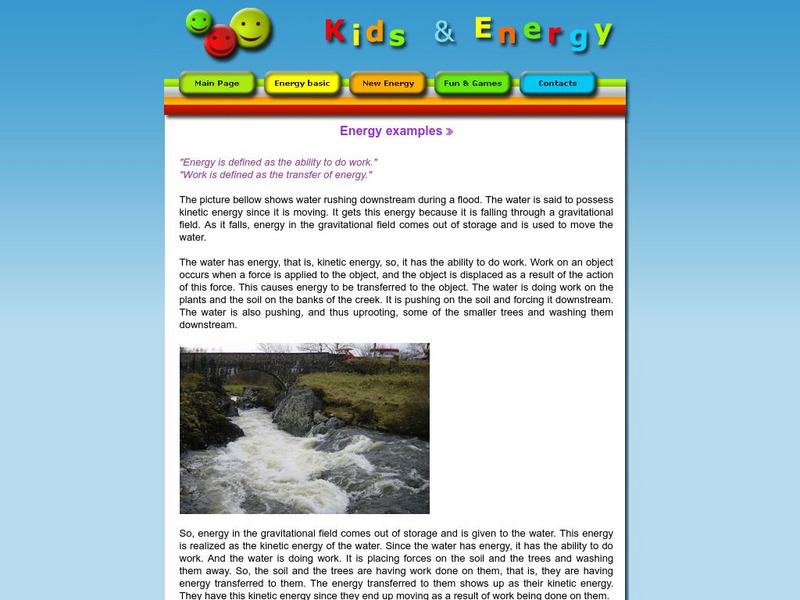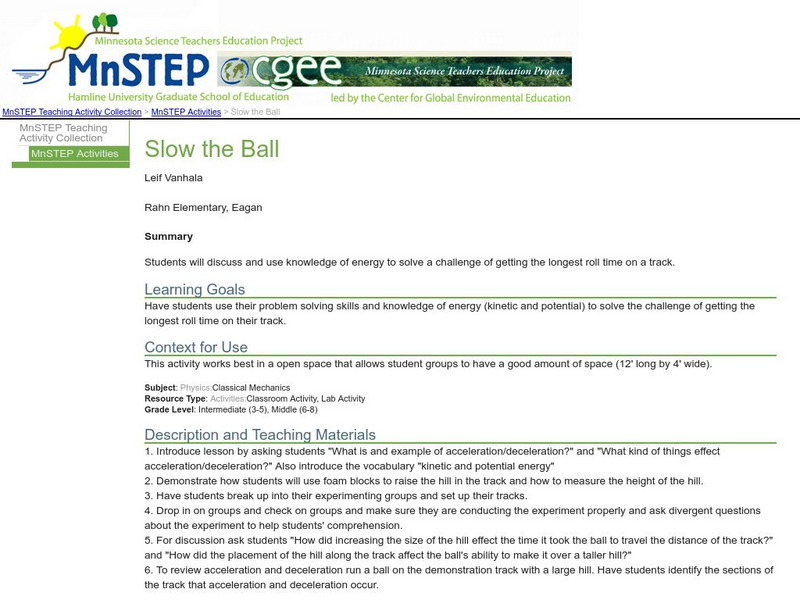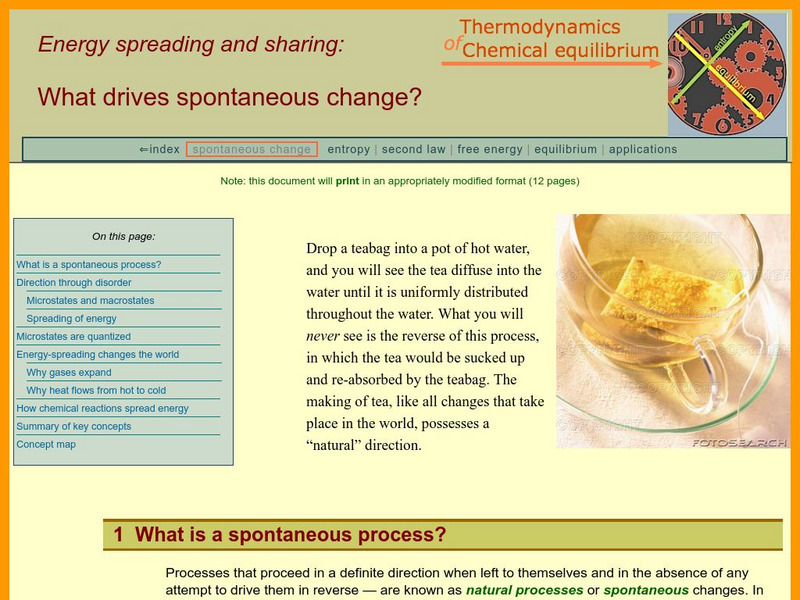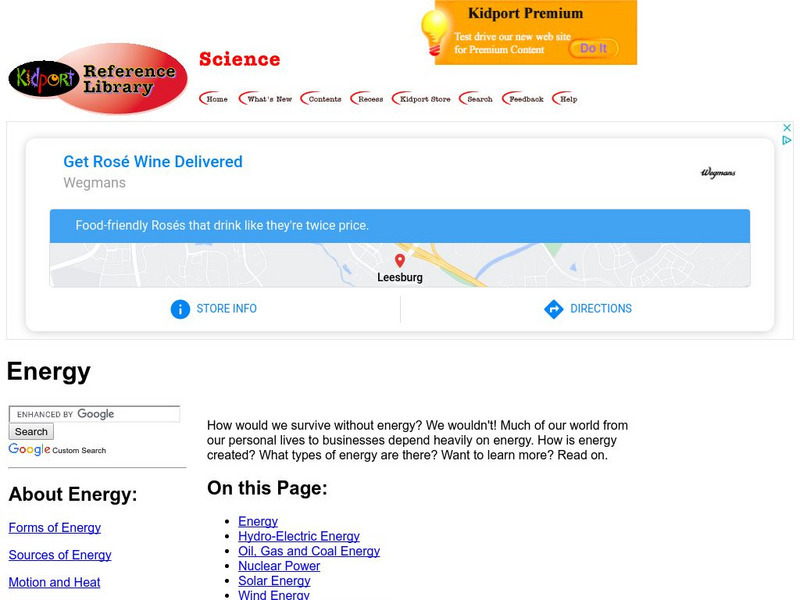Concord Consortium
Concord Consortium What Is Happening When a Spark Occurs? Activity 2: What Happens to Energy When Objects Collide?
An investigation of what happens to energy during changes.
Concord Consortium
Concord Consortium What Is Happening When a Spark Occurs?
Activity 1 of this module investigates: How does potential energy change when things are pushed or pulled? Exploring how force is related to potential energy, this activity investigates how potential energy is changed when a spring is...
Concord Consortium
Concord Consortium: What Is Happening When a Spark Occurs?
Activity 4 in the module investigates If energy cannot go away, why don't things move forever? Conservation of energy is examined. A reading activity, Energy Conservation, is included in this activity.
Concord Consortium
Concord Consortium What Is Happening When a Spark Occurs?
Activity 3 of this module investigates If moving objects have kinetic energy, do moving atoms have kinetic energy? This activity looks at how energy is related to movement of atoms.
Concord Consortium
Concord Consortium: What Is Happening When a Spark Occurs?
Students define potential and kinetic energy, explore energy transfer and energy conservation, and connect energy to atomic structure. The following activities guide students to a conclusion: Activity 1. Can my finger start a fire?...
Concord Consortium
Concord Consortium: How Can a Small Spark Start a Huge Explosion?
In this module Activity 4 investigates How are bonds formed and broken? This activity explores the relationship between energy and the formation and breaking bonds, using the ideas of energy transfer and conversion.
Science Buddies
Science Buddies: Build a Wall Marble Run
In this activity, you will use recyclable materials to make your own wall marble run.
Science Buddies
Science Buddies: Build a Balloon Car
With craft and recycled materials, kids can make all kinds of rolling vehicles. Add balloons to make this balloon car and see Newton's laws of motion in action.
CK-12 Foundation
Ck 12: Physics Simulation: Power and Efficiency Simulation
Explore kinetic and potential energy by towing objects up a frictionless slope.
NASA
Nasa: Kepler's Second Law
This site from NASA states Kepler's second law of planetary motion and depicts its meaning with an informative diagram. Relates the law to conservation of energy principles and discusses the eccentricity of a satellite's (or a planet's)...
NASA
Nasa: From Stargazers to Starships: Energy
Demonstrates how principles of kinetic energy, potential energy and energy conservation can be used to determine the speed of a descending object if given its initial height. Further discussion of other topics such as heat and...
Energy for Sustainable Development
Esd Bulgaria: Kids & Energy: Energy Examples
Explains the definition of energy and gives some examples.
University of Sydney (Australia)
Thermal Physics Module/temperature and Heat [Pdf]
A lengthy set of lecture notes on the distinction between heat and temperature. The science of thermography is introduced; the Kelvin temperature scale is explained and compared to the Celsius temperature scale. The meaning of a triple...
University of Sydney (Australia)
Thermal Physics Module: Thermal Expansion [Pdf]
A lengthy set of lecture notes on the topics of thermal expansion and heat absorption. The concept of specific heat capacity is explained and numerical examples are discussed. Heats of transformation (fusion, vaporization) are explained...
University of Sydney (Australia)
Thermal Physics Module: Ideal Gases [Pdf]
A molecular model of a gas is introduced and explained. Assumptions behind the ideal gas law are presented. The ideal gas law is stated. Charles' law and Boyle's law are derived from the ideal gas law.
New York University
New York University: Measurement of Energy
Provides information about the distinction between heat and temperature, and allows you to check your understanding through exercises. The Kelvin, Fahrenheit, and Celsius temperatures are compared and discussed.
University of Oregon
University of Oregon: Experimental Instructions
Visit this summary of friction. Use the interactive JAVA window to run friction simulations.
Science Education Resource Center at Carleton College
Serc: Mn Step: Slow the Ball
For this experiment, young scholars will design a track for a rolling ball to try to have the longest roll time possible. They will, in the process, apply their understanding of kinetic and potential energy, and acceleration and...
Simon Fraser University
Chem1 Virtual Textbook: How Thermal Energy Is Stored in Molecules
With an overview of topics related to chemical energetics, this site provides a foundation to a study of thermodynamics and thermal energy. Other topics covered include kinetic energy, translation, rotation, vibrations, density, and more.
Kidport
Kidport Reference Library: Energy
A simple introduction to energy, offering information on hydro-electric energy, fossil fuels, nuclear power, solar energy, and wind energy.
Other
Science House: Ice Cream
Experiment shows students how to use the lowered freezing point of water to chill another mixture (ice cream) to the solid state. Teacher's notes provide background information.
Other
Ed informatics.com: What Is Work, Energy and Power?
Defines work, energy, and power. Explains the work-energy principle, types and forms of energy, and presents some exercises to try.
Other
Kinetic Molecular Theory [Pdf]
This PDF is fill in the blank notes, activities and graphic organizers on kinetic molecular theory.
Concord Consortium
The Concord Consortium: Molecular Workbench: Motion Conversion
View the conversion of linear motion to rotational motion.











